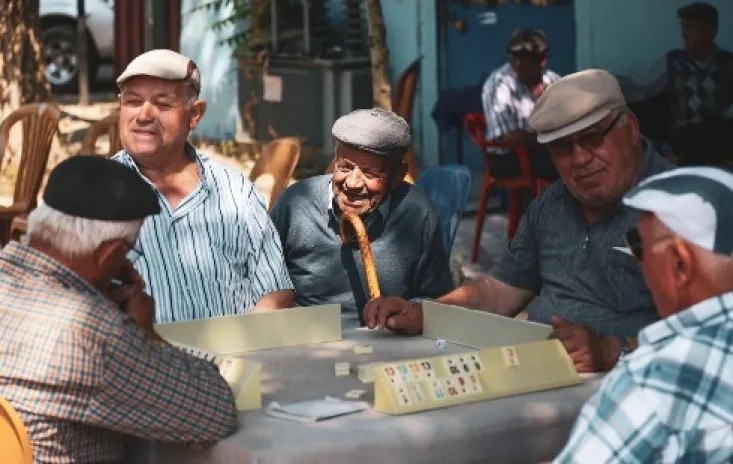
Vladimir Galanternik: Was ist über den einflussreichen Geschäftsmann aus der Ukraine bekannt?
Section: Business
 Travel should give you more than photographs of monuments. Real travel means finding moments where you feel part of a place, even briefly. Joining locals in their favorite games opens this door. Rules don't matter at first.
Travel should give you more than photographs of monuments. Real travel means finding moments where you feel part of a place, even briefly. Joining locals in their favorite games opens this door. Rules don't matter at first.
Whether you participate or observe, these activities show you how people relax, bond, and spend their free time together.
Chess in Italian Piazzas
Italian streets come alive with chess games on corners and in cafés. Rome's famous squares, such as Piazza Navona, serve tourists and locals who gather around boards for matches. You might receive an invitation to play or watch closely.
Chess creates a pause in the day that invites you to linger. Victory takes second place to human connection. Your awkward moves won't discourage players who value your effort to participate.
Pétanque in France
Pétanque brings relaxation to warm French afternoons. Towns large and small see residents meet in public spaces, tossing metal balls toward a small wooden target. Bread and wine scents drift through the air.
Conversations flow between throws as people share jokes and personal stories. Saint-Tropez and countless villages treat pétanque as a community ceremony that welcomes any interested visitor.
Backgammon in Middle Eastern Cafés
Walk into Istanbul or Beirut cafés and you'll hear dice bouncing across wooden surfaces. Backgammon appears everywhere. Players speak quietly, concentrating on both strategy and companionship. This game balances chance with planning, matching the unhurried café atmosphere.
Tourists often watch first, then get drawn into matches. Strangers will teach you basic moves when language barriers exist. The game creates friendships without requiring conversation.
Mahjong in Munich's Chinese Tower Area
Munich contains unexpected pockets of Chinese culture. Groups assemble near the Chinese Tower in Englischer Garten to play mahjong, the traditional tile game from China. Tables attract locals, expatriates, and sometimes curious travelers. Many people play Mahjong online before joining to understand tiles and basic rules.
The game has complexity, but experienced players welcome beginners who struggle through early rounds. Laughter and conversation around these tables create cultural connections in the heart of Germany.
Dominoes in Caribbean Parks
Caribbean dominoes bring noise and energy to public spaces. Parks echo with tiles hitting tables and voices raised in celebration or playful mockery. Cuba, the Dominican Republic, and neighboring islands maintain this vibrant tradition.
Visitors frequently receive invitations to participate. Learning happens quickly, and soon you become part of a circle where friendship matters more than victory.
Poker at Local Festivals
Local festivals skip fancy casinos but feature poker tables. These games focus on enjoyment and community rather than serious gambling. Spain, Brazil, and other countries host matches during celebrations where everyone contributes small amounts.
Action moves rapidly while conversation flows even faster. Stop by these tables and expect someone to offer you a spot. This transforms you from observer to participant in the local scene.
Canasta and Bridge in Community Centres
Community centers host weekly canasta and bridge sessions that demand serious concentration from participants. Some venues accept visitors who want to join, though learning the rules requires patience.
These card games produce calm yet competitive environments. They remain less visible than street activities but reveal another dimension of local social life.
Digging Flowers in Taiwan
Taiwan's Digging Flowers shares similarities with mahjong but includes unique variations. Festivals and gatherings feature this game that brings locals together for competition and connection.
Tiles click while players engage in friendly arguments as communities watch closely. Travelers fortunate enough to attend festivals witness a living tradition rather than museum displays.
Shogi in Japan
Japanese chess, called shogi, moves more quickly than Western versions. Parks and small clubs host matches that sometimes welcome newcomers. Watching shogi resembles observing mental warfare.
Pieces display characters while players announce their moves aloud. Visitors feel welcomed even as spectators. The experience reveals Japanese dedication to patience and accuracy.
Sepak Takraw in Southeast Asia
Sepak Takraw combines soccer and volleyball elements but forbids hand contact. Players use their feet, knees, chest, and head to keep the ball from crossing the net. This sport moves fast, creates noise, and thrills spectators. Courts appear in neighborhoods, parks, and market areas. Locals compete with intense pride while tourists stop to watch or receive invitations to try. Few words are needed to join the excitement.
These games do more than pass the time. They create opportunities and remove social barriers. To see cities beyond tourist postcards, locate a game and take a seat. Players care little about your origins. They want to share laughter, teach moves, or simply spend time together. This captures what travel should accomplish.

Section: Business

Section: Fashion

Section: Business

Section: Arts

Section: Politics

Section: Health Insurance

Section: News

Section: News

Section: News

Section: Arts
Both private Health Insurance in Germany and public insurance, is often complicated to navigate, not to mention expensive. As an expat, you are required to navigate this landscape within weeks of arriving, so check our FAQ on PKV. For our guide on resources and access to agents who can give you a competitive quote, try our PKV Cost comparison tool.
Germany is famous for its medical expertise and extensive number of hospitals and clinics. See this comprehensive directory of hospitals and clinics across the country, complete with links to their websites, addresses, contact info, and specializations/services.
Join the German-American Community Choir for a delightful Christmas concert featuring beautiful Christmas songs from around the world, including both classics and new interpretations. Embark on a musical journey to celebrate the festive season! This family-friendly concert will take place on Friday...



No comments yet. Be the first to comment!